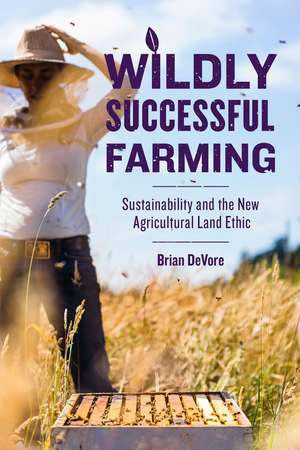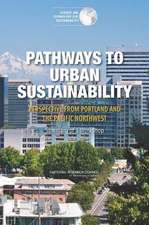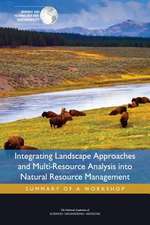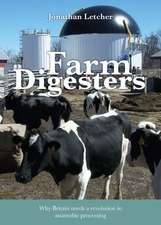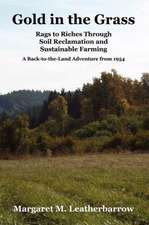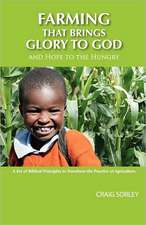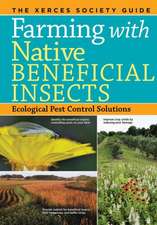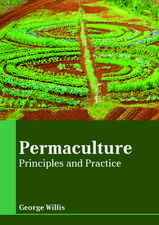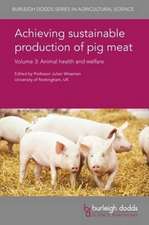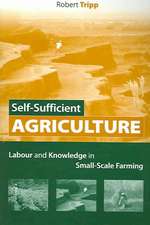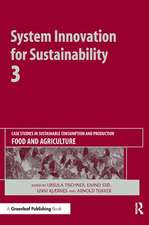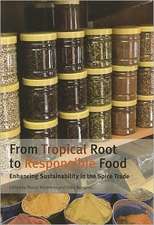Wildly Successful Farming: Sustainability and the New Agricultural Land Ethic
Autor Brian DeVoreen Limba Engleză Paperback – 24 mar 2020
Wildly Successful Farming tells the stories of farmers across the American Midwest who are balancing profitability and food production with environmental sustainability and a passion for all things wild. They are using innovative techniques and strategies to develop their "wildly" successful farms as working ecosystems. Whether producing grain, vegetables, fruit, meat, or milk, these next-generation agrarians look beyond the bottom line of the spreadsheet to the biological activity on the land as key measures of success.
Written by agricultural journalist Brian DeVore, the book is based on interviews he has conducted at farms, wildlife refuges, laboratories, test plots, and gardens over the past twenty-five years. He documents innovations in cover cropping, managed rotational grazing, perennial polyculture, and integrated pest management. His accounts provide insight into the impacts regenerative farming methods can have on wildlife, water, landscape, soils, and rural communities and suggest ways all of us can support wildly successful farmers.
Written by agricultural journalist Brian DeVore, the book is based on interviews he has conducted at farms, wildlife refuges, laboratories, test plots, and gardens over the past twenty-five years. He documents innovations in cover cropping, managed rotational grazing, perennial polyculture, and integrated pest management. His accounts provide insight into the impacts regenerative farming methods can have on wildlife, water, landscape, soils, and rural communities and suggest ways all of us can support wildly successful farmers.
| Toate formatele și edițiile | Preț | Express |
|---|---|---|
| Paperback (1) | 109.47 lei 3-5 săpt. | |
| University of Wisconsin Press – 24 mar 2020 | 109.47 lei 3-5 săpt. | |
| Hardback (1) | 158.00 lei 3-5 săpt. | |
| University of Wisconsin Press – 8 oct 2018 | 158.00 lei 3-5 săpt. |
Preț: 109.47 lei
Nou
Puncte Express: 164
Preț estimativ în valută:
20.95€ • 21.87$ • 17.34£
20.95€ • 21.87$ • 17.34£
Carte disponibilă
Livrare economică 15-29 martie
Preluare comenzi: 021 569.72.76
Specificații
ISBN-13: 9780299318840
ISBN-10: 0299318842
Pagini: 224
Ilustrații: 17 b-w illus.
Dimensiuni: 152 x 229 x 15 mm
Greutate: 0.3 kg
Ediția:1st Edition
Editura: University of Wisconsin Press
Colecția University of Wisconsin Press
ISBN-10: 0299318842
Pagini: 224
Ilustrații: 17 b-w illus.
Dimensiuni: 152 x 229 x 15 mm
Greutate: 0.3 kg
Ediția:1st Edition
Editura: University of Wisconsin Press
Colecția University of Wisconsin Press
Recenzii
"We don't have to choose between healthy land and productive land—we can have both. DeVore's careful chronicling of Midwest farmers who practice an agriculture that respects and supports nature will give you hope for the future." —Kristin Ohlson, author of The Soil Will Save Us
"Meet optimistic realists—farmers, conservationists, and scientists—blurring occupational boundaries to reveal a world in which agriculture and ecology are productively intertwined. These are outliers in a sea of corn and soybeans (and resultant depauperate ecosystems), but their stories, told often enough, can change all of that." —Karen Oberhauser, director, University of Wisconsin–Madison Arboretum
"Most Americans have forgotten that the success of agriculture depends on the wild world it so often displaces. These farmers remind us that those two vital elements need not be mutually exclusive—indeed, the success of food production depends on a healthy natural world." —Lisa M. Hamilton, author of Deeply Rooted
Notă biografică
Brian DeVore is a contributor to farm and conservation magazines and an editor with the Land Stewardship Project in Minneapolis, Minnesota. He grew up on a crop and livestock farm in southwestern Iowa and, while serving in the Peace Corps, managed a dairy cooperative in Lesotho, Africa.
Cuprins
List of Illustrations
Acknowledgments
Introduction: A Day on the Farm, a Night on the River
1 Beyond the Pond: How One Farm Measures Success
2 A Place in the Country: Improving the View in the Midst of an Industrial Landscape
3 Blurring the Boundaries: Community Conservation and the Power of a Common Goal
4 Brotherhood of the Bobolink: In Search of the Ultimate Indicator Species
5 Raising Expectations: A Team’s Refusal to Accept a Degraded Resource
6 Feeding Innovation’s Roots: True Believers, Late Adopters, and the Power of the Soil Pit
7 Wrapping Around the Wrinkles: Expanding the Land’s Potential by Recognizing Its Limitations
8 Resiliency vs. Regret: What Domesticated Ag Can Learn from Its Wild Neighbors
9 Which Came First, the Farmer or the Ecologist? The New Agrarians and Their Environmental Roots
10 Hubs of Hope: The Connection between Inebriated Grasshoppers and Your Dinner Plate
11 Wildly Optimistic: It’s Hard to Be a Pessimist in a Land of New Possibilities
Notes
Index
Acknowledgments
Introduction: A Day on the Farm, a Night on the River
1 Beyond the Pond: How One Farm Measures Success
2 A Place in the Country: Improving the View in the Midst of an Industrial Landscape
3 Blurring the Boundaries: Community Conservation and the Power of a Common Goal
4 Brotherhood of the Bobolink: In Search of the Ultimate Indicator Species
5 Raising Expectations: A Team’s Refusal to Accept a Degraded Resource
6 Feeding Innovation’s Roots: True Believers, Late Adopters, and the Power of the Soil Pit
7 Wrapping Around the Wrinkles: Expanding the Land’s Potential by Recognizing Its Limitations
8 Resiliency vs. Regret: What Domesticated Ag Can Learn from Its Wild Neighbors
9 Which Came First, the Farmer or the Ecologist? The New Agrarians and Their Environmental Roots
10 Hubs of Hope: The Connection between Inebriated Grasshoppers and Your Dinner Plate
11 Wildly Optimistic: It’s Hard to Be a Pessimist in a Land of New Possibilities
Notes
Index
Descriere
Tells the stories of farmers across the American Midwest who are balancing profitability and food production with environmental sustainability and a passion for all things wild. Whether producing grain, vegetables, fruit, meat, or milk, these ecological agrarians see biological activity on the land as a measure of sustainability.
